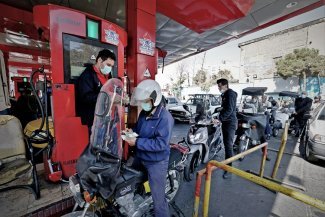In November 2019, journalists in the Srinagar region of Kashmir protested against the widespread internet blackout imposed 100 days prior by Indian authorities after the northern Indian state’s semi-autonomous status was revoked.
Internet censorship comes in a variety of forms. It usually involves extensive surveillance, often specifically targeting whistle-blowers, journalists, activists and defenders of human rights. It can also take the form of censorship of sites and applications; in Iran, for example, Facebook and Twitter cannot be accessed without the use of a VPN (Virtual Private Network) key. In Venezuela, following the political crisis of January 2019, deliberate shutdowns have been mostly politically motivated, last several hours and take place each time Juan Guaidó, opponent of President Nicolas Maduro, gives a speech or holds a conference.
Lastly, total internet blackouts can leave entire regions or countries in absolute digital silence. This is the case in Ethiopia, where military authorities have imposed a blackout in the western Oromia region since January, as well as in India and Myanmar, both of which have targeted specific communities. After revoking Article 370 of the Indian constitution, which granted autonomy to the majority Muslim province of Kashmir, the Indian government imposed a complete communications blackout in the province from 5 August 2019 to early March 2020, when authorities only restored access to a slower 2G network. Myanmar’s blackout, in place since the summer of 2019, targets the Rohingya, the country’s Muslim minority. Such targeted and discriminatory censorship is harder to monitor, thus complicating the work of organisations that fight internet censorship.
These organisations have observed spikes in outages during elections and protests. As Berhan Taye, a senior policy analyst at Access Now, a human rights organisation dedicated to ensuring internet access around the world, tells Equal Times: “When an internet shutdown occurs, we know that human rights violations will follow, that an election will be affected and/or, in the case of protests, that several people will die.”
In the vast majority of cases, governments censor the internet under the pretext of national security, though their actual aim is to prevent the organisation of citizen opposition. As Katia Roux, advocacy officer on human rights defenders at Amnesty International France, tells Equal Times: “The muzzling of civil society is moving into the digital sphere. Some countries are investing in digital technology to prevent access to information and repress dissident voices.”
For authoritarian regimes, this is also a means of erasing all traces of abuses. “Blackouts are never permanent, they are used to get rid of evidence. When the network comes back online, bodies have disappeared never to be seen again. These threats to the population have a paralysing effect on freedom of expression,” says Roux.
This is exactly what happened in Kashmir and Sudan in the summer of 2019, when international media and Amnesty International exposed numerous cases of violence while the internet was down, including the use of force to disperse protesters, arrests and even torture. In Sudan, such incidents of violence were confirmed by videos broadcast once service was restored. The same occurred in Iran, where the internet was cut for ten days in November 2019 following protests against rising petrol prices. “Because of the internet blackout in Iran, it was very difficult to get information on what happened during the protests. Amnesty International was nonetheless able to publish statistics on the number of people killed [editor’s note: 304]. Being able to continue this research and investigation work is essential to building cases for legal proceedings,” says Roux.
Violation of the right to access information
In addition to facilitating repression, internet blackouts deprive populations of essential information (places to avoid, access restrictions, information on police brutality, etc.) and further isolate people by preventing them from contacting their families, whether inside or outside of the country.
Against the current backdrop of the of the coronavirus pandemic, the right to information is all the more important as it allows people to educate themselves on preventative measures and thus prevent the spread of the virus in countries whose healthcare systems would be quickly overwhelmed in the event of major contagion. Slow internet speeds in Kashmir mean that even healthcare professionals are unable to access information on the virus from the internet and from peer networks, and are thus unable to relay this information to the public. “In Kashmir, in Myanmar, in Bangladesh and recently in Ethiopia, governments are choosing who can access this vital information and who cannot,” says Taye, who runs Access Now’s #KeepItOn campaign, which calls for an end to internet shutdowns.
China, which already has a complex system of information control, has gone even further in its censorship in order to counter online criticism of its handling of the crisis. “Key words such as ‘Wuhan’ were classified as sensitive and combinations of words were systematically blocked. The strategy citizens used was to replace one word with another. An alternative language had to be developed, so citizens established a code,” Roux explains. “This circumvention strategy already existed. What was new was that in certain cases, internet users were able to anticipate censorship,” she says, with users, for example, coming up with an alternative word for ‘Red Cross’ before China could censor it.
Silencing journalists is also a way to censor information. In China, freelance journalist Chen Qiushi, who was covering the coronavirus crisis, has been missing since 6 February. His friends and family believe that he has been placed under house arrest. In Iran, journalist Mohammad Mosaed was arrested, interrogated and then censored for criticising management of the coronavirus crisis. While he awaits trial, his social media accounts have been suspended and he can no longer do his job.
In addition to the dangers that internet shutdowns pose to public health, countries where they have been implemented have also experienced significant economic losses. The NGO NetBlocks, which monitors the state of the internet around the world, estimates economic losses in Sudan of over US$10 million a day. According to the organisation, Iraq, the country the most economically impacted by internet shutdowns, saw losses estimated at €864 million after a seven-day blackout in October. In Iran, a country already stifled by American sanctions, former chamber of commerce president Mohsen Jalalpour confirmed that a shutdown in November 2019 cost the country US$1.5 billion. This is compounded by the long-term loss of consumer and investor confidence, as well as serious disruptions to development policies.
Even more worrying, countries are attempting to stem these economic losses by making the structure of the internet increasingly complicated and by creating a ‘national internet’, as China and more recently Iran have done, and Russia seeks to do. According to Kavé Salamatian, professor of computer science at the University of Savoie Mont Blanc in France, several network structures exist. “On one end of the spectrum, you have Chinese- or North Korean-style architecture, that was designed from the beginning to be controlled. At the other end, you have countries like France, where operators are interconnected […]. And then there are countries that want to restructure their architecture to have more control.”
As Salamatian explains, Iran has been working on restructuring its network since the Green Movement of 2009. Taye confirms that, “In Iran, after the 2009 elections and the protests that followed, the authorities realised that in order to extend the number of blackouts, they were going to have to separate essential institutions [banks, financial and health services, electricity] from the global internet network. Once a separate network has been created, they can ensure that essential institutions will continue to function even in the event of a shutdown,” she explains. “What they are doing is making sure that internet blackouts can last longer without affecting their interests.”
The role of service providers and anti-censorship organisations
Service providers that execute the orders of authorities are often singled out for criticism. They defend themselves from any complicity, citing clauses that permit countries around the world to legally cut internet service, particularly for reasons of national security. “The problem is that when operators enter a space and sign an agreement with a government, it is very difficult for them to say no because they risk losing their license. But that doesn’t mean that they have no power,” says Taye of Access Now.
Operators can indeed take steps to ensure that laws are respected. Orders to shut down the internet, for example, must be legal and in writing, which is often not the case. And under the terms of the contracts, which also bind them to their customers, operators are obliged to inform them of any cuts and of the duration of those cuts. Last June in Myanmar, Norwegian operator Telenor warned consumers of internet shutdowns in the provinces of Rakhine and Chin and in a press release that stated that: “From the time of receiving the directive, Telenor Myanmar has been asking for further clarification on the rationale for the shutdown and emphasised that freedom of expression through access to telecoms services should be maintained for humanitarian purposes, especially during times of conflict.”
During a shutdown in Zimbabwe in January 2019 following protests against rising petrol prices, Econet Wireless, the country’s largest operator, confirmed that it had received an order to cut its internet service: “Our lawyers advised we are required to comply with the directive pending the court’s decision on its legality.
According to Taye, operators often “do too much,” and should limit themselves to that which they have been ordered to do. “They were ordered to shut down Facebook and Instagram [in Zimbabwe], but they also included WhatsApp. Why are they doing more than what is asked of them? They’re losing money too,” she says.
Operators indeed record significant losses with each shutdown, as well as risk their reputation and with it investor and consumer confidence. This is one of the reasons that human rights organisations are increasingly taking legal action against operators as well as governments.
Whether they are successful or not, legal proceedings help to raise awareness of human rights abuses and call out violations of freedom. “International justice is complex and legal proceedings can take a long time, but they remain an important lever. They send a signal that says ‘watch out, the world is watching’. They create pressure and that pressure has to be maintained. Failing to do so would send a dangerous message that risks encouraging impunity,” says Roux.
As internet shutdowns and digital censorship evolve, the number of legal proceedings is also increasing. Lawsuits are generally brought by civil society organisations and are not without risks for independent lawyers, who may receive threats. Anti-censorship organisations have few weapons at their disposal. As Taye puts it: “Our weapons are our voices that we use to tell the stories of the people who are affected by these completely unjust circumstances.”











